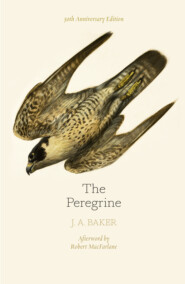скачать книгу бесплатно
For I mean, in addition to the standard definition of that word, his ability to make what is immaterial and without physical form somehow concrete and solid. He reifies the invisible. His prose puts flesh on the white bone of light, space, time, gravity and the physics of movement. It is as if he encountered the air as the material element that we know, from chemistry – oxygen, nitrogen, etc. – that it is, but which we seldom, if ever, truly experience. It was an art that seems almost ecologically adapted to capturing the fastest flying bird on Earth. Baker and the peregrine were a perfect consummation. Yet this special gift is everywhere in Baker’s writings. Here is how he sees a group of greenfinches:
Frequently the flock flew up to the trees with a dry rustle of wings, then drifted silently down again through the dust-moted trellis of sun and shade. The yellow sunlight flickered with a thin drizzle of bird shadow.
In The Peregrine the ability to envision the heavens as something solid leads to a whole sequence of metaphors in which the air and its inhabitants are described in terms of marine life. As Baker looked upwards, so he seems to peer down into the ocean depths. Most beautifully, towards the end of the book, he imagines the falcon: ‘Like a dolphin in green seas, like an otter in the startled water, he poured through deep lagoons of sky up to the high white reefs of cirrus.’
Elsewhere as Baker muses on the fluidity and apparent joyfulness of a seal’s motion at sea he speculates:
It is a good life, a seal’s, here in these shallow waters. Like the lives of so many air and water creatures, it seems a better one than ours. We have no element. Nothing sustains us when we fall.
Here Baker edges towards a remarkable revelation about the whole nature-writing genre. On reading the passage, one thinks of the specific creatures (as well as their most devoted author/admirers) that have made the deepest appeal to the modern British imagination: the otter (Henry Williamson, Gavin Maxwell), whales and dolphins (Heathcote Williams and the whole New-Age fixation with cetaceans) and birds, particularly birds of prey (W.H. Hudson, T.H. White and J.A. Baker himself). If we cannot move between the elements like these wonderful animals, then humans can at least imagine what it is like to be an otter or a peregrine. But no writer I know has taken us deeper into the life of another creature and allowed us to experience how that elemental mastery might possibly feel than John Alec Baker.
Mark Cocker, March 2010
Вы ознакомились с фрагментом книги.
Для бесплатного чтения открыта только часть текста.
Приобретайте полный текст книги у нашего партнера:
